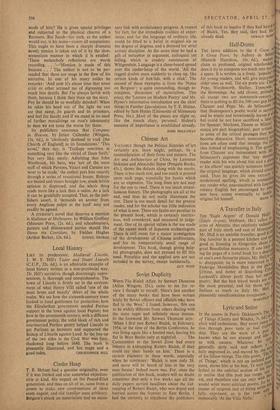Local History
LiKE Its predecessor, Medkeval Lincoln, J. W. F. Hill's Tudor and Stuart Lincoln (C.U.P., 32s.• 6d,), is an admirable example of local history written in a non-provincial way. Dr. Hill's narrative, though disarmingly unpre- tentious, is thorough and comprehensive. The town of Lincoln is firmly set in the environ- ment of what Henry VIII called 'one of the most brute and beastly' shires of the whole realm. We see how the sixteenth-century town looked to local gentlemen for protection; how the Elizabethan government needed Puritan support in the town against local Papists; but how in the seventeenth century, with a different government policy, the solid block of rich and intermarried Puritan gentry helped Lincoln to get Puritans as lecturers and supported the Bishop of Lincoln against Laud. So the line-up of the two sides in the Civil War was fore- shadowed long before 1640. The book is pleasantly illustrated, and has maps and a










































 Previous page
Previous page